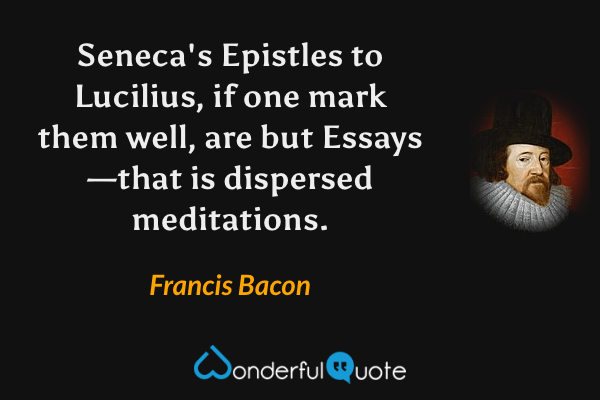Essays Quotes
Most popular essays quotes

The wildness of those compositions which go by the name of essays.

Seneca's Epistles to Lucilius, if one mark them well, are but Essays—that is dispersed meditations.
An essay is a work of literary art which has a minimum of one anecdote and one universal idea.

There are dark and morbid moods in which I am tempted to feel that Evil re-entered the world in the form of Essays. The Essay is like the Serpent, smooth and graceful and easy of movement, also wavering and wandering.
A form [of writing] that's like a pair of baggy pants into which nearly anyone and anything can fit.

Essays, entitled critical, are epistles addressed to the public, through which the mind of the recluse relieves itself of its impressions.

We would not want to think of the essay as the country of old men, but it is doubtful that the slithery form, wearisomely vague and as chancy as trying to catch a fish in the open hand, can be taught.
Essays...although they go back four hundred years to Montaigne, seem a mercurial, newfangled, sometimes hokey affair that has lent itself to many of the excesses of the age, from spurious autobiography to spurious hallucination, as well as to the shabby careerism of traditional journalism. It's a greased pig.
Essays...hang somewhere on a line between two sturdy poles: This is what I think, and this is what I am.
Essays belong to the animal kingdom, with a surface that generates sparks, like a coat of fur, compared with the flat conventional cotton of the magazine article writer, who works in the vegetable kingdom, instead.

Essay. A loose sally of the mind; an irregular indigested piece; not a regular and orderly composition.
How like an eel this essay creature is. It wriggles between narcissism and detachment, opinion and fact, the private party and the public meeting, omphalos and brain, analysis and polemics, confession and reportage, persuasion and provocation.
An essayist is, essentially, writing the biography of a thought, allowing cognition itself—its circuitry and obsessiveness, its "moments of being," as Virginia Woolf called it—to play out on the page.
An essayist is a lucky person who has found a way to discourse without being interrupted.
Give the mood, and the essay, from the first sentence to the last, grows around it as a cocoon grows around the silkworm.

The essayist is a self-liberated man, sustained by the childish belief that everything he thinks about, everything that happens to him, is of general interest. He is a fellow who thoroughly enjoys his work, just as people who enjoy bird walks enjoys theirs.

The essayist arises in the morning and, if he has work to do, selects his garb from an unusually extensive wardrobe: he can pull on any sort of shirt, be any sort of person, according to his mood or his subject matter—philosopher, scold, jester, raconteur, confidant, pundit, devil's advocate, enthusiast.
In a way, an essay is just a grown-up version of the tie-breakers in supermarket quizzes: Complete the line "I think history is bunk because...." in not more than 10,000 words.

Vague as all good definitions are, a good essay must have this permanent quality about it; it must draw its curtain round us, but it must be a curtain that shuts us in, not out.


